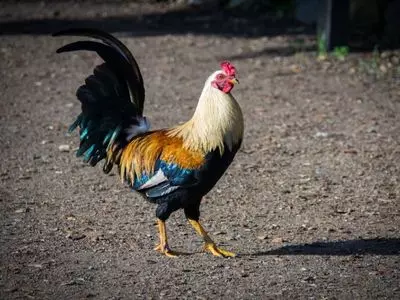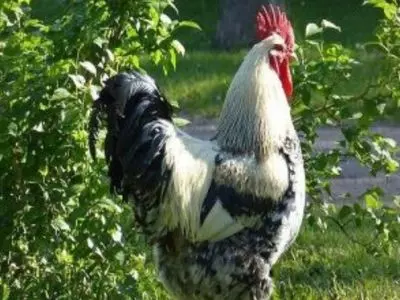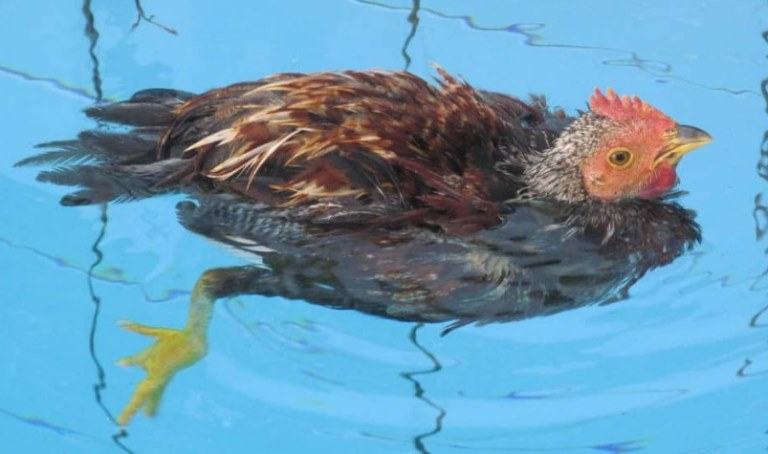No products in the cart.
Chicken
Can Chickens Swim or Float Like Ducks? – The FACTS
When you first become a chicken keeper, there are hundreds of things that you need to know like the back of your hand about chicken’s life. One of the top questions relating to this kind of animal is “can chickens swim?”
If you are eager to find out the answer to this question just like me, check out the detailed information below!
*This post may have affiliate links, which means I may receive commissions if you choose to purchase through links I provide (at no extra cost to you). As an Amazon Associate I earn from qualifying purchases. Please read my disclaimer for additional details.
Can chickens Swim?

Well, yes, chickens love water and can naturally swim, that’s the truth, but only for a short length of time as their bodies are not designed for swimming long like ducks.
These little birds’ wings and legs might seem impossible for a swim, however, don’t be fooled by their cover. Chickens do swim when it is necessary for them. What’s more, if you place them in water, they will adapt quickly.
Although chickens do not have webbed feet like ducks, they still can paddle in their own way, just slow with light strokes.
Besides, their feathers are not waterproof, which inherently becomes heavily waterlogged and causes the chicken to drown.
Sometimes, people misunderstand that the way ducks and chickens swim, for example, taking a dip in the water is the same.
Because ducks belong to a water habitat, their feathers are water-resistant which means that ducks will never be affected by the heaviness of the water. Chickens, on the contrary, are easier to sink if they spend too much time swimming.
Another factor influencing chickens’ swimming – they intend to panic when suddenly fall into the water.
Normally, chickens will not find themselves in a place with deep water. Nevertheless, they often wander around to look for food and water to satisfy their thirst and hunger.
As a consequence, they may accidentally fall into the water containers. So, you should supervise your chickens and not let them get close to those dangerous places.
If your chickens accidentally fall into a pond and are soaking wet, you have to pull them out quickly and dry them. If not, your chicken may get hypothermia and eventually die.
Here’s a video showing how to get your chickens into a body of water safely:
Check more: Top 13 Beautiful Black And White Chicken Breeds
Can Chicks Swim?
Unfortunately, chicks cannot swim. It will immediately get waterlogged, drown and die if it falls into a lake.
The main reason is that baby chicks’ feathers are not thick enough. Thus, when it comes to entering the water, they could be in danger of drowning.
You have to make sure that chicks are in a safe spot. In case your chicks get wet, you have to dry them out immediately and make their body warm. Chicks can suffer from hypothermia and die.
Additionally, it is better that you prevent baby chicks from swimming. Sometimes, chicks follow their mother and enter the water.
As they are still small and weak, it is hard for them to handle the water. So, keeping your eyes on the chicks will be a necessary thing that you must bear in mind.
How to Look After Chickens While Swimming
It’s essential to ensure that your chicken has a safe place to swim.
Their feathers do have a bit of waterproofing to them, but they can still get cold when wet. Ensure the water is not too deep, and provide a ramp or steps so they can easily get in and out.
You should also change the water regularly to prevent it from getting dirty.
If your chicken does get cold, you can help them dry off by gently towel-drying its feathers.
Also, be sure not to leave chickens unsupervised in a body of water if they aren’t usually in there or if it’s a new area for them as it’s best to always keep an eye on them so they are safe.
Read More: Can Chickens Fly Over Fences? Chickens can fly, but not like most birds. Here’s how to keep your chickens home!
Should Chickens Swim Regularly to Stay Healthy?
Swimming is a great way for chickens to get exercise. It helps to build muscle and strengthen their heart and lungs.
Swimming can also help reduce stress and improve circulation. In addition, swimming in cool water can help regulate a chicken’s body temperature on hot days.
Of course, not all chickens like to swim. Some chickens may never take to the water, while others may only enjoy it on occasion.
However, if your chicken does enjoy swimming, it’s important to make sure that the water is safe.
Avoid using chlorinated pools or ponds, as the chemicals can be harmful to chickens. Instead, opt for a clean, natural body of shallow water such as a plastic kiddie pool.
Read More: Do Chickens Have Ears? Chickens do have ears! Learn about chickens’ ears in this interesting post.
Problems With Chickens Swimming

If chickens swim too much, their feathers can become waterlogged, making it difficult for them to stay warm.
Chickens can also ingest harmful bacteria from dirty water, which can lead to illness.
It’s important to make sure that chickens have a safe place to swim and that they don’t spend too much time in the water.
Read More: Are Chickens Reptiles? We explore the biology of chickens in this guide!
Conclusion
To conclude everything, chickens are able to be in the water, but they cannot actively move their feet to swim.
This means that they are willing to get in the water and can be safe there, but they must be watched so that you can ensure they don’t get hurt or drown.
If you’re letting your chicken swim then be sure to watch them closely and should be kept in water they can stand in.

